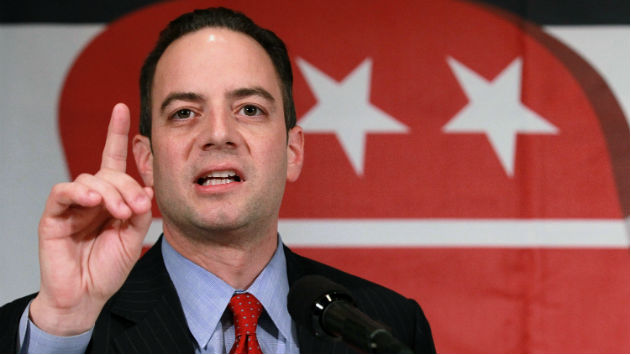Why the Republican National Committee Is Obsessed with Uber
Published at
 Alex Wong/Getty Images(WASHINGTON) — Uber, the global ride sharing company that’s taken the transportation industry by storm, would seem like the kind of organization that transcends political affiliation.
Alex Wong/Getty Images(WASHINGTON) — Uber, the global ride sharing company that’s taken the transportation industry by storm, would seem like the kind of organization that transcends political affiliation.
But that hasn’t stopped Reince Priebus, chairman of the Republican National Committee, from engaging Uber in a proxy war over conservative principles.
On Thursday morning, the Chicago Tribune published an op-ed by Priebus in which he attacked “special interests and liberal politicians” for threatening to regulate Uber and favor the traditional city cab monopoly, without mentioning specific Democrats.
To Priebus, any local or federal regulation symbolizes a larger effort on the left to stifle competition.
“How many companies, how many products, how many innovations have died prematurely because the government overreached and interfered in the free market? Government has a role to play, but that role isn’t to protect the status quo,” he wrote.
Because the RNC is holding its annual summer meeting in Chicago, Priebus pointed to Illinois Governor Pat Quinn’s handling of his state’s fight over Uber.
“Here in Illinois, Gov. Pat Quinn and his fellow Democrats have been less than hospitable to Uber. True to form, Quinn has stood silent while his allies attempt to regulate and restrict innovation and entrepreneurship,” he wrote.
Quinn has yet to sign into law legislation regulating Uber, which has been sitting on his desk since July 14.
On May 28, Chicago’s City Council approved an ordinance endorsed by Mayor Rahm Emanuel, a well-known progressive, that does not regulate ride sharing fares or restrict the number of companies, cars, or drivers operating in Chicago.
Some prominent Democratic politicians, like Maryland Governor Martin O’Malley, have actually taken an equally hard-line stance in favor of Uber: in response to the state’s Public Service Commission’s ruling that Uber must have a permit to operate in Maryland, he said: “We shouldn’t try to limit a 21st century marketplace with 20th century regulations.”
The benefits of supporting Uber’s independence from local, state, and federal regulation are seemingly endless for Republicans. It gives the party more of a glossy, modern touch — the feeling that they’re in tune with the concerns of younger voters. It also aligns the party with an increasingly influential technology industry that has long been seen as a progressive ally. It ingratiates the party with a sector that can offer indispensable campaign resources in 2016. And, as in Priebus’ editorial, it gives them the chance to reinforce core conservative ideals as part of an issue that’s ostensibly apolitical.
In an email to ABC News, RNC Press Secretary Kirsten Kukowski expanded Priebus’ argument in discussing an RNC-sponsored petition in support of Uber, saying, “This messaging is very much in line with the pro-growth economic messaging of the Republican Party…it also helps us reach a growing number of Americans who believe the government has overstepped and shouldn’t be picking winners and losers — mostly because of what the Obama Administration and the Democrat [sic] Party stands for these days.”
The increasing tone of the fight has come at a time when Silicon Valley, viewed as a bastion of Democratic Party ideals with its free-wheeling entrepreneurial ethos, has been shifting its ideas — and its slogans — to Washington. The technology industry’s fingerprints are all over the Beltway. Last year, Google expanded and relocated its offices to a space just blocks away from the U.S. Capitol. In April 2013, a Washington-based lobbying group called FWD.us that looks to advocate for the technology industry’s positions on immigration and education reform, was founded by Joe Green, a Silicon Valley entrepreneur with close ties to Mark Zuckerberg. The calls to “innovate” and “disrupt” political culture in Washington have come from all over.
Donna Harris, co-founder of the Washington, D.C. startup incubator 1776, sees Priebus’ editorial as just one side of the fight. She said Republicans can use the anti-regulation approach and Democrats can support Uber because of the environmental benefits of ride sharing.
“Uber resonates far more than a message directly about a political issue. If I can put it in terms of something that is meaningful to me personally, the issue resonates,” she said. “If you think about the issues related to startups that have caught the eye of politicians, it has historically been macro-level issues. …[Uber] is one of the very first examples on scale that politicians have that’s a hyper-localized, hyper-personal issue.”
Brian Weiss, a spokesman at TechNet, the bipartisan Washington trade group that includes a wide array of technology executives, said the organization has written to Quinn urging him to veto laws that restrict Uber’s ability to operate freely.
“As written, these bills would impede the growth of new transportation options offered by Uber and others, just as the citizens of Illinois are experiencing the advantages of these services,” he wrote in an email.
Uber itself has no interest in getting involved with Priebus’ comments, offering only one comment on the issue. Asked by ABC News what the politics behind the editorial could mean, Uber spokesman Lane Kasselman steered clear of controversy that could arise from the RNC’s effort to provoke partisan tension on the issue.
“Everyone loves Uber,” he said.
Follow @ABCNewsRadio
Copyright 2014 ABC News Radio


